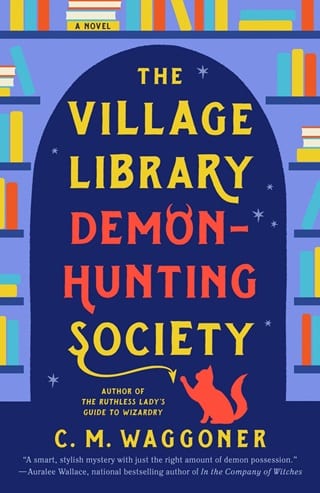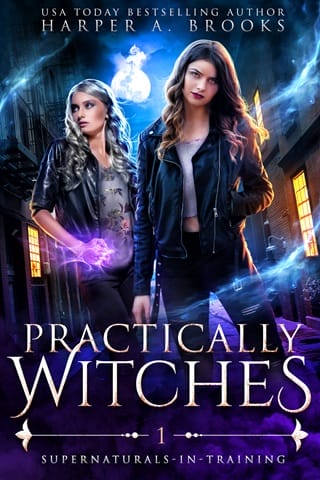Chapter Twenty-One
Twenty-one
She headed down to the library as fast as she could, feeling sure now that there was something that she needed to do there. Whatever it was that Sheriff Brown had said to her kept slipping in and out of her head, but she felt deeply convinced that there was something at the library that would help it to all make sense. Something that she'd forgotten about.
When she arrived, she started out at the card catalog, thinking that maybe something there would spark a memory. Nothing was sparked. Then she started prowling through the whole library, waiting to see if a specific shelf or display or book title would jog her memory. Nothing did, until she completed a full circuit of the front room and came to the door to the room that they never used. She almost walked right past it. Then she stopped, turned, and looked at it very carefully.
Why didn't they use this room?
She tried to think back, to remember if she'd ever been given an explanation for it. She thought as hard as she could. Nothing. No one had ever said a thing. No one had ever told her that they never used that room. She'd just—known it, somehow. Known that this was a room that was never used and a door that was never, under any circumstances, to be opened.
She reached out to try the door handle.
Reality shifted in its seat, straightened its jacket, and started the moment over.
She blinked, then frowned. She was standing in her favorite cozy corner in the library, the one near the room that they never used, and she couldn't remember why. She turned around to look at the armchair, just in case she'd set something down there that she'd come back to get. Something like a book. Something like her—
Her what? She remembered being back home in Florida, patting her pockets and checking her purse, making sure that she had her wallet, her keys, and her—
What happened to the internet, Sherry?
She turned back to face the door that was never opened, reached out, and tried the handle.
Locked.
She huffed out a frustrated little sigh. Of course it couldn't be that easy. She checked her own key chain first, on the off chance that she'd had the key the whole time. She hadn't. She moved on to her desk and systematically worked her way through the contents of every drawer. No luck. She sat down for a moment to think. Her predecessor, she'd been told, had been a very organized woman, but her systems of organization for anything other than books—books had always been meticulously dealt with based on library best practices—had made more sense to herself than they had to other people. She'd apparently had a particular penchant for packing things neatly away into old boxes and storing the boxes in the basement. These boxes, unfortunately, were generally unlabeled, since she had the ability to recall with perfect clarity that the Christmas lights were in a box with a picture of a television on it, while the supplies for the annual garden party were boxed up in packaging that had originally held a window air-conditioning unit. Sherry had never had the key to the unused room. It only made sense, then, that her predecessor would have been the last one to have it, and that she would have tidily put it away in a place that made sense to her before she left.
The basement it was, then.
Sherry had never liked going down into the basement. Maybe it was a relic of her Floridian childhood: she'd never even seen a basement in real life until she moved to New York, and there was still something about them that she found deeply unnerving. There was nothing normal about climbing into a pit in the ground to find the Christmas decorations.
The library basement was less threatening than a basement might be, at least, with patchy brown wall-to-wall carpeting on the floor and innumerable books destined for the gruesome annual cull known as the library book sale lining the walls. The unlabeled boxes full of mystery contents lined the wall closest to the staircase. Some brave soul—possibly Beth, judging from the handwriting—had made an attempt to label some of them with their contents (one read snowman costume , and another clay supplies ) before giving up a few boxes in. Sherry skipped by those and settled on a plan of action, which was, essentially, "Pick up one box at a time and shake them to see if they rattle." If they rattled, she opened them up to check for keys. Most of them didn't contain keys. One of them, bafflingly, contained a large button collection. Maybe someone had done a craft activity involving buttons. She moved through a few more boxes, discovering a collection of assorted mysterious electrical cords, ancient Magic Markers, and an assortment of cutlery. Then, finally, the jackpot: an old cookie tin that gave a particularly loud and resonant rattle, and, when opened, revealed a large collection of orphaned keys of all shapes and sizes.
She carried her new treasures upstairs, fighting against a mounting sense of unease and unmoored guilt, as if she was carrying something out of a shop without paying for it or trying to surreptitiously stick a flyer for a fringe political movement onto a public bulletin board. The feeling only got worse as she reached the door to the locked room, and increased in its pitch as she proceeded to grimly, one at a time, attempt to fit the keys into the keyhole.
She didn't even have to turn the seventh key in the lock to know that she'd found the right one. She could tell just from the surge of fear that hit her gut, the conviction that nothing would ever be right in the world until she dropped the key, ran away from the door, and never touched either again. She ignored the feeling. She pushed right through it. She turned the key in the lock and opened the door.
The computer lab.
It made sense immediately. There was no confusion this time, no sense of reality reordering itself to reject what she could see. Of course the library had a computer lab. There was the printer. There was the scanner. There was the neat row of monitors lined up down a long table against the wall. There was the computer lab, and if she turned one of the computers on, she'd be able to use the internet.
It was remarkable how easy it was. She didn't even have to think about it: she was navigating to Google in under two minutes and typing in Corey Thompson's name.
It took a while to find him. There were, apparently, a very large number of Corey Thompsons in the world. She tried it in combination with his father's and brother's names, then just Alan's name with various terms related to his job, and finally struck gold with Alan's Facebook page.
It was unexpectedly wrenching to see it. Just Alan's ordinary life, before Sherry had entered it: pictures of him with his sons and grandchildren, and posts from people congratulating him on his retirement or wishing him a happy birthday. They'd continued all the way through him opening his antiques shop, then abruptly stopped. That gave Sherry another jolt. The problem wasn't Winesap, then: it had been a normal town not too long ago, where people remembered that it was the twenty-first century and that the internet existed. Things had only gotten truly weird when Sherry came to town.
From Alan's page it was easy enough to find his sons'. Eli had never been particularly active on his: most of the posts on his page were group shots that someone else had tagged him in. He apparently belonged to a running club in Connecticut. She clicked on their page and scrolled. They'd had an event—a five-mile "fun run," which didn't sound particularly fun to Sherry—on the day of Alan's death. She clicked through the photos. There was Eli, running in the middle of the pack. After the run, the group had gone to a brewery. No Eli in those pictures. The location of the run was about four hours from Winesap, which would have given Eli a long enough window to drive to Winesap and arrive with time to spare. She couldn't rule him out, though she did wonder what could have happened at a fun run to trigger the desire to drive across state lines and bludgeon your own father to death with a lamp. If he'd planned it ahead of time, it meant that he was calculating and coolheaded enough to know that he should stick to his usual schedule on the day in question to avoid suspicion. The thought made Sherry shiver.
She returned to his page and searched for any signs of his mother having an internet presence. Eventually she hit one via pictures from a family birthday party. Her page was much like her older son's: the only activity seemed to be requests for birthday donations to various worthy organizations and pictures of her looking poised and polished at various openings and galas shared by the pages of said organizations. She had, however, not been tagged in anything on the evening of her husband's murder.
Corey's page was easy to find from there, and of a very different character. He'd been extremely active on Facebook a decade earlier, posting lots of pictures of himself and updates about what he was doing, to the general interest and acclaim of his many friends. Then the posts tapered off, replaced at first with cross-posts from Instagram and then with nothing. She navigated over to Instagram, then spent a frustrating few moments trying to click on things before she was forced to create an account to look at anything. Her fingers typed in an email address and password without her having to think about it. For a username, she considered for a moment before typing in imbrandon1992 . A Brandon born in 1992 seemed like the sort of person who might follow Corey on Instagram. She found a picture of a blandly handsome young man walking on a beach to serve for a profile picture. Then, after a bit more fussing, she was ready to go.
Corey's Instagram was very…illuminating. She'd rarely seen so much of a young man whom she'd only recently been introduced to. He certainly took very good care of himself. He also very obviously spent an enormous amount of money to keep up with his evidently very wealthy social circle. There were lots of pictures of him on boats and in beautiful houses in the Caribbean, to the point where it seemed that he spent very little time at home. This, Sherry thought, would be a good excuse to economize on housing and rent a modest studio as a home base, but Corey clearly had other ideas. The few pictures he posted of his apartment emphasized the wall of floor-to-ceiling windows overlooking a swath of Manhattan. She was looking at the comments under one of these photos from several weeks earlier when she saw a very familiar jawline in one of the profile pictures, next to the comment Miss this view .
She clicked through, and there he was, sprawling attractively in a chair somewhere outdoors, the lighting falling flatteringly on his cheekbones. The profile was set to friends only, and the area where he could describe himself was blank. He had several thousand followers. If she hadn't spent so much time staring at his twin's earnest face while he babbled nervously about exorcisms, she might have second-guessed herself, but as it was, there was no question in her mind that this was Todd. She checked the comment he'd made on Corey's post again. Next to it was the notation "9w." He'd been commenting on Corey's Instagram over two months ago and had been inside his apartment before that. When he'd said that they'd met once at a recent party before running into each other on the train, he'd been lying. Now she only had to figure out what the lie had been covering up. She clicked on the follow button, then minimized the window and stood. She would have to wait for him to accept her request, and she had to get to a lunch date.
Walking through Winesap felt stranger, now that she'd been so forcibly relocated back to the second decade of the twenty-first century. She was suddenly conscious of the place as a stage set. She'd never been someone who paid much attention to cars, but even to her untrained eyes it was plainly evident that the vehicles of Winesap had emerged out of a time warp: the seventies, eighties, and nineties appeared to be well represented, but she couldn't see anything that looked much more contemporary. The people, too, were all dressed as if the most recent twenty years had never happened, though it was hard to pinpoint most of them as belonging to any particular era. Two young girls walked past in blue jeans and flannel shirts: Were they dressed up as if they were from the nineties, or were they simply wearing outfits that wouldn't have looked out of place on teenagers at any point over the past few decades? A man went by in a tweedy brown suit that looked as if it could have been from the seventies, but also might just have been the choice of a man who liked the idea of wearing tweed with leather elbow patches. Sherry looked down at herself: blue jeans, winter boots, blue hand-knitted sweater, heavy blue wool coat. Once again, nothing to mark itself out as being of any particular moment between 1970 and the present. Nothing to prompt questions or disturb the suspension of disbelief. Nothing, she realized abruptly, that couldn't possibly be seen on an extra in an episode of Murder, She Wrote .
She arrived at the diner exactly on time. Father Barry, predictably, had arrived early. She settled in across from him and made awkward small talk—it was hard not to be awkward when you suspected that someone's twin brother might be involved in some kind of dastardly criminal scheme—until Charlotte and Todd arrived together, bursting through the door in a cloud of conspiratorial laughter and settling into opposite sides of the booth: Charlotte next to Sherry and Todd next to his brother. Sherry tried not to make eye contact with poor Barry, and failed.
"I'm starving ," Charlotte said, with gusto, and snatched up a menu to peruse. She looked very refreshed and very happy. Sherry took the opportunity to peruse her own menu and avoid looking at Todd. From what she could see of him, he looked smug. Good for both of them, she supposed, but she wasn't sure she appreciated the ease and speed with which Todd had managed to insert himself into her inner circle.
"How did your visit to the antiques shop go?" Sherry asked, once they'd all ordered their food. "Did you find anything?"
Charlotte grimaced. "No," she said. "Alice said that the cops took her store key, so we had to, uh. Find the door just coincidentally unlocked. "
Todd gave a very nice smile and added helpfully, "I learned how to do that in high school. With a paper clip. My parents used to lock me out when I stayed out past curfew, and Barry always slept through it when I threw rocks at his window."
"I didn't sleep through it when you threw a rock through my window," Barry muttered.
Everyone ignored him. Sherry pressed Charlotte. "How about signs of a previous break-in? Did everything look normal to you?"
"Nothing looked too weird," Charlotte said. "It was a little hard to tell. We didn't turn the lights on in the shop because people would see it from the street. We turned them on in the back office, though, so we could see to look around. There was a safe, but Alice told us about that ahead of time and said that they kept cash in there for the register, nothing else. We looked through the desk but there was just electric bills and stuff."
"And I doubt that the accounts would have been in the safe if Alan had been planning on looking at them at home," Sherry said with a disappointed little sigh. "If he'd forgotten, he would have left them on the desk, not locked them up in the safe. So we're left with someone having taken them. Either the police or someone who didn't want them looked at." Like Alice, who worked for Alan and always seemed desperately short of money. Or like Corey, Alan's ne'er-do-well son who'd been helping him at the store and always needed money.
Or like Todd, who'd almost certainly slept with Corey at least once, more than two months earlier, had subsequently lied about it, had a previous fraud conviction, and had managed to involve himself in the investigation into Alan's death from almost the instant he'd arrived in Winesap.
She couldn't say any of this aloud to this group, of course. Todd had already clearly managed to wedge himself firmly into Charlotte's life, and he'd been part of Father Barry's this whole time. For all Sherry knew, Barry had been accidentally slipping him information about the investigation since it first started. Or, she realized with a jolt, Barry could have been sharing information deliberately . It wasn't as if she really, truly knew him that well. He'd just been kind to her when she'd needed help, and she'd immediately started acting as if they'd had years of close friendship. She would have to be more careful from now on. She'd always worked mostly alone, before this bunch came into her life. Starting from this lunch, she needed to play things much more carefully. No more running to her friends for advice and feedback. The demon wanted her to investigate, just her, and it was becoming apparent that she would have to take care of things alone either way.
"Sherry!" Charlotte said in Sherry's right ear, jolting Sherry out of her reverie. "I have something for you." The twins appeared to be having some kind of quiet argument; for the moment, she and Charlotte were unobserved.
Sherry sat up straighter in her seat. She did love a present. "Oh! What is it?" she asked, then smiled as Charlotte handed it over, pleased, if a little baffled. "Oh, goodness, it's beautiful ."
It was a necklace, the sort of piece of impressive statement jewelry that she always admired on Charlotte but would look silly paired with her own usual modest little department store sweaters and blue jeans. She had no idea why Charlotte would give it to her.
"It's red branch coral," Charlotte said, seeming uncharacteristically bashful. "I was trying to come up with something I could do to help out with the demon problems, and I thought about my jewelry collection. Crystals have powers, right? So I called my witch friend and asked, and she said red coral is supposed to protect against evil, like, all over the world, in China and ancient Rome and the Americas and all through history, which I thought would probably cover our bases if our demon here is from, I don't know, ancient Macedonia or something. So, I picked this out, and she helped me do a blessing over it. It's vintage, so it's definitely actual coral. I figure it couldn't hurt if you wore it, right?"
"According to my cat," Sherry said, "it's mostly about whether we believe that it will help. Which I think I do. I think all of those people all over the world must have known something."
Charlotte looked relieved. "Me, too," she said, like a confession. "I mean—there's something about it that feels right." She cleared her throat. "My friend says to make sure that the coral's touching your skin. That helps it to work."
Sherry put on the necklace and tucked it in under her shirt. It was long enough to drape over her heart. The red of the coral was the same red as the berries she'd pulled from the yew branch to make her dagger, which was still tucked safely into her coat pocket. She put her hand into her pocket to touch it, and yelped as a painful surge of heat passed through her fingers and her chest.
"What?" Charlotte asked, clearly startled.
Sherry licked her lips, then smiled. "I think that it's working already," she said.
Charlotte didn't laugh or smile. Instead, she just nodded. "Good."
Their food arrived, bringing with it a wave of comforting ordinariness that made the strange, ancient power that Sherry was increasingly convinced that she really had managed to cook up out of a roadside shrub and some statement jewelry recede to a more comfortable distance. They all lapsed into eating paired with safe small talk. Todd was surprisingly voluble on the topic of the best tuna melt in New York , a subject in which he apparently had a particular interest. Sherry picked at her food for a while—uncharacteristically, she didn't have much of an appetite—then stood. "I have to go," she said. "Thank you very much for all of your help."
Charlotte and Todd were, at this point, too wrapped up in giggling with each other to notice her, but Father Barry frowned. "Are you all right, Sherry?"
Oh, he was good. No wonder she'd liked and trusted him so quickly. He could tell the second her mood shifted. "I'm fine," she said firmly. "Thank you, Barry." Then she added a quick, apologetic little, "If I need help, I'll—" She stopped. Call you , she'd been about to say. Call him on the smartphone that she now remembered had until recently always been in her purse, and which she could have used to very quickly perform many of the tasks she'd recently performed with endless phone calls and poring over microfiche. Where had all their phones gone? She strained to think, but she couldn't come up with anything. Maybe they were all neatly piled behind some door in Winesap that everyone knew they weren't supposed to open.
Barry was looking more worried than ever. She hastily finished her thought. "If I need help, I'll let you know."
He nodded. He had a look to him like he knew that something had shifted. "Good luck, Sherry."
She swallowed, nodded back, and left.
 Fullepub
Fullepub 



